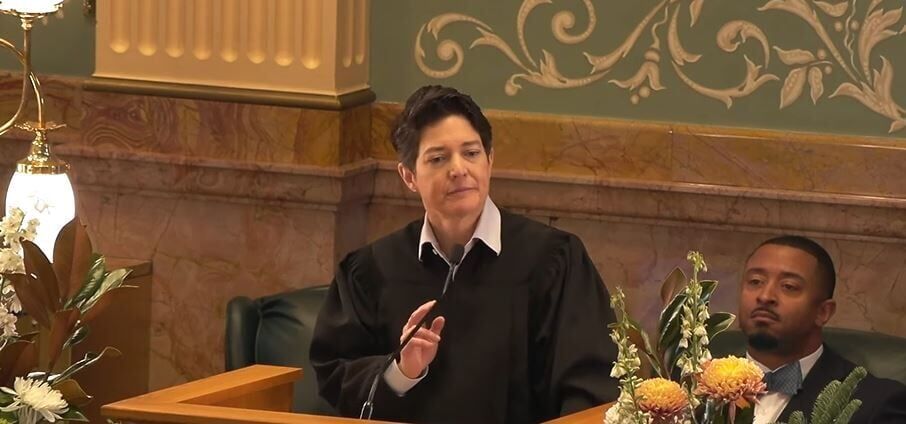‘Running on empty tanks’: Chief justice addresses legislature with plea for more judges
Chief Justice Monica M. Márquez delivered her plea for more judges to the entire legislature on Friday, saying workloads are more demanding and well-meaning legislative changes have contributed to the burdens on the bench.
“We cannot ask our judges, day in and day out, to make consequential decisions impacting people’s lives when they are running on empty tanks,” she said. “This request is ultimately about ensuring that the people of Colorado receive timely, fair and wise resolution of their cases.”
The chief justice’s biennial “State of the Judiciary” address to the General Assembly was the first for Márquez, who moved into the Supreme Court’s top role last summer. A member of the court since 2010, Márquez succeeded Justice Brian D. Boatright, who was the first to become chief under the court’s rotational system established in 2020.
Márquez’s pitch for additional judges mirrored her comments earlier this week to the powerful Joint Budget Committee, as well as her informal remarks at a legal event in November. The Senate and House judiciary committees will conduct an oversight hearing of the Judicial Department on Monday, where the topic of judgeships will likely also arise.
The Judicial Department’s legislative priority is the establishment, over a two-year period, of 26 additional trial court judgeships in areas where the need is greatest and three new positions on the Court of Appeals. Sens. Dylan Roberts, D-Summit County, and Lisa Frizell, R-Castle Rock, have already introduced a bill to implement that increase to the state’s roughly 340-judge bench.
“The state is absorbing hundreds of domestic violence cases following Aurora’s announcement that it will no longer prosecute domestic violence cases in municipal court. Virtual proceedings are placing more demands on judge and staff time,” Márquez said. “For judges in the jurisdictions targeted in the bill, the current situation is unsustainable.”
Already, some members of the budget committee have expressed skepticism about the ability to fund the permanent positions, which will exceed $20 million annually. The state is facing a roughly $672 million deficit, with cuts on the table for multiple agencies.
“We’re in the hole. We have to dig out of that hole before we can talk about increases anywhere in this budget,” Sen. Barbara Kirkmeyer, R-Brighton, told Márquez during Tuesday’s Joint Budget Committee hearing. “I’m just telling you the dire straits we’re all in. And when I say ‘we all,’ that means you, too.”
Rep. Ryan Armagost, R-Berthoud, a member of the House Judiciary Committee, told Colorado Politics that policies encouraging recidivism and “creating more cases” should be the subject of scrutiny, rather than additional judgeships.
“The legislature deliberately politicized the courtroom and sentencing process, resulting in a clogged justice system,” he said. “The chief justice believes throwing more money and robes at the problem will fix it. That makes as much sense as an ashtray on a motorcycle. She must realize courts cannot spend their way out of bad legislation — especially in a budget crisis.”
Márquez did cite legislative changes that she deemed meritorious as nonetheless driving judges’ increased workloads.
Lawmakers have “expanded, thankfully, the opportunities for parents and children to be heard in child welfare cases, added opportunities to seal criminal records, created opportunities for tenants to be heard in evictions and mandated the use of body cameras — which creates significant additional evidence that has to be reviewed in many cases,” she said. “These changes are valuable and create appropriate additional protections for litigants, but implementation of these protections necessarily adds to our judges’ workload.”
Among other challenges, Márquez listed declining civility, security threats, polarized rhetoric and virtual court disruptors. During her prior in-person appearance and in written comments to the Joint Budget Committee, Márquez recounted an incident in the San Luis Valley in which a person tried to smuggle in a bludgeoning instrument to attack a county court judge, and the January 2024 arson at the judicial center in downtown Denver.
To the joint session, Márquez also referenced a suicide at Denver’s courthouse, a fatal shooting in Colorado Springs, a bomb threat in Alamosa and various death threats against judges.
She thanked the legislature for authorizing emergency funding to address one area of concern: procuring a new digital court platform to replace Webex, a virtual program primarily for office use. The limitations of the platform have allowed disruptors to hijack virtual proceedings with racial epithets, violent videos and pornography.
Finally, she alluded to comments Boatright made in his 2023 State of the Judiciary speech about improving workplace culture and reforming judicial discipline. Márquez noted half of judges and most of the “core workforce” have joined the judicial branch since 2020.
This month, Márquez amended and expanded upon a chief justice directive addressing the responsibilities of chief judges for the various judicial districts and for the Court of Appeals. Among other things, the detailed policy lays out new expectations for communication, transition planning and transparency.
She added that the Judicial Department is working on a way for employees to provide feedback about chief judges’ performance to them and to her.





